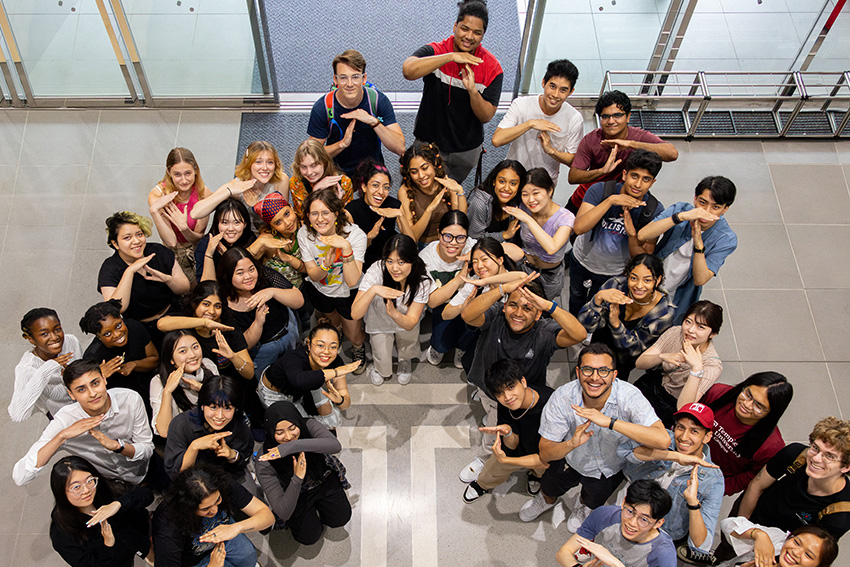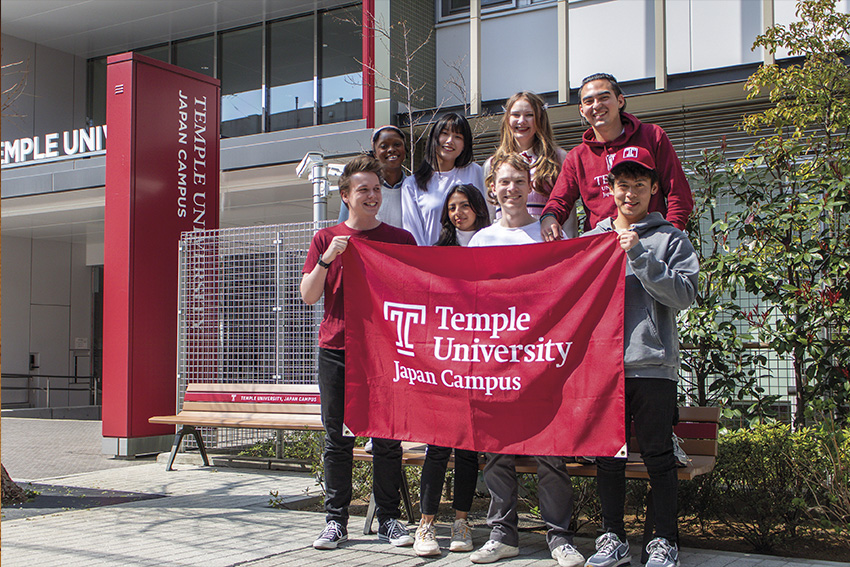Foreign universities can play a vital role in Japan by building bridges and increasing accessibility for international students, while also providing Japanese students with an opportunity to experience a unique educational experience enriched by a global perspective.

Established in 1982, Temple University, Japan Campus (TUJ) stands as the largest and oldest foreign university in Japan. As a full-service branch campus of the renowned Temple University, which was founded in 1884 in Philadelphia (USA), TUJ offers American-style higher education in Japan, fostering global mindsets and understanding, and offering a borderless and innovative academic experience that prepares students for success in an interconnected world.
TUJ offers a wide array of undergraduate majors including Art, Asian Studies, Communication Studies, Economics, General Studies, International Affairs, International Business Studies, Japanese, Political Science, Psychological Studies, Computer Science, and Tourism, Hospitality, and Event Management. These programs are designed to equip students with a comprehensive understanding and skill set in their chosen fields, preparing them for global careers. Beyond its undergraduate program, TUJ also features graduate programs through Temple’s Graduate College of Education (MSEd, PhD), Fox School of Business (Master’s in Management), and Beasley School of Law (LLM). It also offers various non-degree programs such as Continuing Education, Corporate Education, and the Academic English Program. TUJ was the first university to be officially designated a Foreign University, Japan Campus by Japan’s Ministry of Education, Culture, Sports, Science and Technology in 2005.
Although Japan is the fourth largest economy in the world, it has a relatively low percentage of international students compared to other countries. TUJ’s student body consists of students from approximately 70 countries and regions, including the United States, East and Southeast Asia, Russia, the Middle East, Africa, Latin America, and Europe. And this diverse student body helps make TUJ a rich, dynamic, and stimulating institution.
Part of the university’s unique appeal to overseas students is its affordability and accessibility, as highlighted by Matthew J. Wilson, dean and president of TUJ. “It really comes down to accessibility, and I think this is where TUJ excels. As an educator, I want to introduce future leaders and difference-makers to Japan. Our campus offers such an incredible pathway to Japan and Asia. The TUJ experience also comes with Temple University’s high quality and global reputation. Temple is a Carnegie Research 1 designated institution and highly ranked globally.” he explains,
“We have over 2,200 undergraduate students at TUJ. Our degree-seeking student population has nearly doubled over the past three years. This growth is driven by our commitment to introduce people to Japan and international education. Accessibility is a key factor in making this happen,” adds Dean Wilson.
The faculty at TUJ consists of an internationally diverse group of educators who are encouraged to teach in an interactive American methodology focused on the use of critical skills development. “Universities play a huge role in the development of those critical skills, and you can’t dismiss communication. The role that communication plays isn’t just language to language, rather it is culture to culture. It is all about understanding the mindset of others, and Japan is such a great place to do that,” Dean Wilson elaborates.
“Really, you have to be special to study here at TUJ. If you are Japanese, the traditional track is comfortable and simple, but the students we have here at TUJ from Japan are extraordinary as they immerse themselves in English learning from professionals and experts from around the world. Likewise, if you are from France or Spain, you can distinguish yourself by stepping out of your comfort zone and flying across oceans into a different culture. When I think about the future, we are really drawing people in and making Japan accessible on top of teaching people how to function not only within society but also to move forward with a more global society.”
Building on Temple University’s current locations in Philadelphia, Tokyo and Rome, the latest addition is Kyoto, Japan, coming in 2025. TUJ’s new multi-building satellite location in Kyoto—Japan’s imperial capital and cultural and historical mecca—provides students a base from which to explore the Kansai region. The new Kyoto satellite is located on the former Kyoto headquarters of the Japanese Imperial Army (a designated registered tangible cultural property). TUJ KYOTO consists of two large university buildings just a short 12-minute walk from the famous Fushimi Inari Shrine, one of the top tourist destinations in Japan.
"The Kyoto site has plenty of space for students from around the globe. I think moving forward we are really going to be able to provide people from outside of Japan with both a modern and a traditional experience with Tokyo and Kyoto, something that I really think is unparalleled. If I were a student, I would just jump at that, and part of the appeal is making sure that we are providing the top-quality education that Temple is known to provide,” adds Dean Wilson.
“We've also learned over TUJ’s 42-year history in Japan that location really matters in terms of attracting students, attracting faculty, and job opportunities. Kyoto is very cultural and historical, but it is also dynamic. Kyoto has a significant student population, so there is a lot of talent that is there, and if you look at the attractiveness, everyone visiting Japan wants to go to either Tokyo, Kyoto or both. Now look at our strategy to bring in Temple’s Tourism, Hospitality, and Event Management major, and it is kind of a perfect fit.”

TUJ Students
Students can go out and really experience these incredible cities in western Japan, such as Kyoto, Osaka and even Kobe, getting a unique opportunity to integrate and interact with the local community through community service, internships and other initiatives. TUJ dean states. “In Kyoto, a key focus is having every faculty member out in the community, allowing those students to go and experience the world beyond the classroom. It always makes me smile when we have difference-makers in Japan tour our campus and quickly realize that TUJ is truly international. We offer a unique experience through our professors, approaches, programs, and a diverse student body.
Addressing the main challenges that international students face in Japan, Dean Wilson identifies access to accommodation, the difficult Japanese job market, and health services in English. Indeed, with accessibility being a major part of its ethos, TUJ strongly supports its students in overcoming these obstacles.
“If we look at housing first, when we bring students into TUJ, we arrange housing for them for their first semester. They have a base, and then during the first four months they are here, we invite realtors who have English speakers to come and show the foreigner-friendly apartments they have found. This takes a lot of work, but once it's in motion we place almost all those students into housing,” explains the TUJ dean, who also discusses the possibility of establishing a large residential student complex—which could be a collaboration with other universities—as another measure to tackle this issue.
On the employment side, he describes the situation as “almost one-to-one, hand-to-hand guidance. We are talking to employers, finding employers, and helping them understand that these students are top talent and that they can help companies build bridges overseas. I think that fortunately we are doing a better job now and that is partly due to our increased visibility.”
While mental health awareness varies across cultures, adapting to a new country, often alone, with a completely different culture and language, can often be daunting for young students. That is why TUJ has an Office of Student Services and Engagement that goes above and beyond to plug its students into English language resources and services, including mental health services.
The rapid pace of change due to digital technologies is another key challenge for TUJ and all universities alike. However, Dean Wilson is embracing new technologies such as AI. “With AI, I'm excited because it challenges us to evolve our teaching methods. In today's digital age, we need to ensure our education adds value beyond what students can easily access online. It's about enhancing critical thinking and application of knowledge, not just memorization,” he adds.
What's more, TUJ has developed a full esports program, offering an undergraduate academic certificate in esports. "If you look at the video game industry today, there are billions of dollars in investment, but universities are only focused on the recreational side, whereas we are more focused on the academic side of it," the TUJ dean states.
Looking forward, the expansion plans for TUJ are not just about physical growth but also about enhancing the quality and scope of its educational offerings. The proposed increase in STEM courses is part of this vision, addressing the global demand for skills in science, technology, engineering, and mathematics. By doubling the number of STEM courses, TUJ aims to equip students with the skills necessary to succeed in a technology-driven global job market.
Dean Wilson concludes: "Our mission at TUJ is to offer an education that transcends traditional boundaries. We are preparing global citizens who are ready to address the challenges of the 21st century. Whether it’s through expanding our campuses or enriching our academic programs, we remain committed to providing our students with the best possible educational experiences. This commitment extends beyond our current plans and into the future, where we continue to envision a vibrant, interconnected, and successful global community."
The expansion into Kyoto and the ongoing enhancements in academic programs are just the beginning. With a solid foundation in place and a clear vision for the future, Temple University, Japan Campus is set to continue its role as a leader in international education in Japan, shaping the minds and futures of students from around the globe.
To hear more from President Matthew J. Wilson of Temple University, check out this interview with him
0 COMMENTS